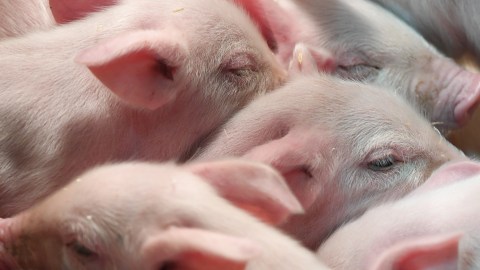Why some philosophers think you should be a vegetarian

Photo by RJ Sangosti/MediaNews Group/The Denver Post via Getty Images
- The moral arguments behind vegetarianism are ancient, numerous, and well reasoned.
- They tend to focus on the actions behind meat production.
- While the question of what an ethical diet is remains unanswered, these thinkers and schools provide a good place to start.
Vegetarianism is having a moment in the sun. Record numbers of people are giving it a try, the number of places offering vegetarian food is ever-increasing, and the variety and quality of vegetarian alternatives to meat products are rising with it.
But, is this all just misplaced environmental concern, sentimentality, and hippie mumbo jumbo? After all, the stereotype of a vegetarian remains less than flattering. Or is there a method to the bacon-denying madness? Today, we’ll look at three philosophies that endorse vegetarianism, outline their arguments, and consider if you should put that piece of steak down.
Peter Singer’s Utilitarianism: The life you can save might be a pig’s
Peter Singer is an Australian philosopher well known for his work in Utilitarian ethics. His 1975 book Animal Liberationis a groundbreaking work in the field of animal rights and presents a bold program for treating animals much better than we currently do.
He begins with a simple idea: animals have interests that should be considered equal to the similar interests of human beings. If it is wrong to inflict unnecessary pain on human beings, then it is also wrong to do it to animals.
While it is true that many arguments have been made to separate humans and animals because of the differences between them, Singer points out that we never apply them to other members of the human race. If we can’t hurt and eat people with very low intelligence or who cannot use language, then why do we justify eating animals because they don’t use syntax? Since animals clearly can feel, why should we not consider them as equal when calculating the net pleasure and pain caused by an action?
He argues that any attempt to morally separate humans from other animals when it comes to whose pain matters is based primarily on speciesism, prejudice against other animals, rather than a consistent logic and should be rejected. He then concludes, given the nature of industrial farming and the suffering many animals endure because of it, that we should switch to vegetarian and vegan diets to maximize the total happiness.
There are two subtleties to his arguments that must be remembered. The first is that he is not talking about “animal rights” in the pure sense. He certainly isn’t arguing that an elephant be given the right to vote. He is arguing only that the difference between pain in humans and elephants is morally irrelevant and that the elephant’s interests should be considered as equal to a humans’ when deciding what to do.
Secondly, he is a utilitarian, and some apparent contradictions come with that. Most notably, he argues that some medical experimentation on animals is morally justifiable, as the benefits of the research will significantly outweigh the pain caused to the animal in the laboratory. Similarly, while he likes free-range farming as an idea, he doesn’t encourage it in all cases as it can be worse for the environment than factory farming. The cost to benefit ratio doesn’t quite work out for him.
His work has been widely influential, and most of the modern animal liberation movement cites him as a major influence. However, some philosophers, such as Richard Sorabji, have argued that his moral theory is simplistic and gives rise to strange moral instructions in some situations.
Religious Objections: Thou Shalt Not Kill Anything
Many religions have lines of scripture that are commonly interpreted as encouraging or even mandating vegetarianism.
The Dharmic Religions of India are well known for their tendency towards vegetarianism. In Jainism, vegetarianism is mandatory, as harming animals is considered bad karma. Hinduism and Buddhism also have scripture forbidding violence against animals, but how much that applies to the killing of animals for food is still debated. For those who do eat meat, ritualized methods of minimizing the suffering of the animal before death exist.
A third of Hindus are vegetarians. The number of vegetarian Buddhists is not known with certainty. The Dali Lama tried the diet for a while himself but was forced back to omnivorism again for health reasons. He continues to encourage vegetarianism in the name of reducing the suffering of animals.
Similar ideas exist in the Abrahamic traditions, though they are notably less hardline. Some Rabbis have argued that Judaism encourages vegetarianism, and many Christian monastic orders have been vegetarian though history. Leo Tolstoy, the author of War and Peace, incorporated vegetarianism into his Christian pacifism later in life, as eating meat required “an act which is contrary to the moral feeling- killing.”
Pythagoras, of the theorem, encouraged an entire way of life named for him which included vegetarianism. This was perhaps motivated by his belief in reincarnation and aversion to violence.
Environmentalism: The hippies are taking over!
Lastly, many recent thinkers, including Steve Best and Peter Singer, have put forward arguments based on the environmental costs of industrial animal farming as a reason to cut back on our animal consumption. They point to studies like one in Nature, which reminds us of how much of the carbon footprint of meat production we’ll have to cut back on if we want to reach our goals in the fight against climate change.
You might have noticed that most of these schools and thinkers share a common theme; they tend to object to the production of meat, the killing and suffering of the animal, rather than the actual act of eating it. Some people make arguments along these lines, but they are in the minority.
Most, if not all, of the thinkers mentioned above would undoubtedly be fine with lab-grown meat if the energy costs of producing it could be lowered. Similarly, many debates over if it is alright to eat oysters, which probably can’t feel pain and are rather plant-like, have taken place as part of the broader discussion of moral vegetarianism.
There you have it; philosophers are often behind vegetarianism, and they make very good arguments as to why you should eat less meat, if any at all. While they won’t convince everybody to switch to tofu, they do provide an excellent starting point for any discussion of what an ethical diet is.





